 |
|
Co-Chair Ilkka Ristimäki
(Finland) welcoming the delegate of Portugal, representative of
the EU >
|
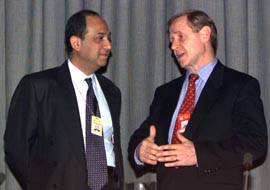
|
Opening statements: |
|
|
David Harcharik, Chair
of the Interagency Task Force on Forests (ITFF), called attention
to three key issues: objectives, implementation and partnerships.
Regarding implementation, he emphasized the need for concrete actions
for implementing recommendations, and said money is the best measure
of commitment.
 Real Audio: "...if you decided
to keep the process going, I can only plead with you to know where
you are going and why. (...) we can never ask ourselves too often
the most fundamental question of all: 'what are we trying to achieve.'"
Real Audio: "...if you decided
to keep the process going, I can only plead with you to know where
you are going and why. (...) we can never ask ourselves too often
the most fundamental question of all: 'what are we trying to achieve.'"
|
|
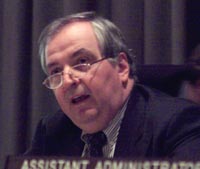 Klaus
Töpfer, UNEP Executive Director, said that forests could no longer
be considered as a factory for timber as they are important for Klaus
Töpfer, UNEP Executive Director, said that forests could no longer
be considered as a factory for timber as they are important for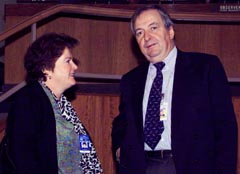 conservation and the protection of the environment. He highlighted
the importance of forests and wooded land for water management,
biodiversity conservation, and breaking the vicious cycle of poverty
associated with deforestation and drought. In closing, he said problems
created yesterday cannot be solved with yesterday's thinking. Right:
Töpfer and Jill Hanna of the European Commission.
conservation and the protection of the environment. He highlighted
the importance of forests and wooded land for water management,
biodiversity conservation, and breaking the vicious cycle of poverty
associated with deforestation and drought. In closing, he said problems
created yesterday cannot be solved with yesterday's thinking. Right:
Töpfer and Jill Hanna of the European Commission.
 RealAudio excerpts
RealAudio excerpts
|
|
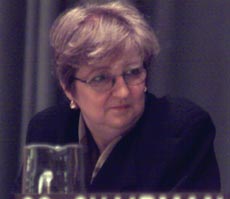 Louise
Fréchette, UN Deputy Secretary-General, noted governments are gradually
recognizing the consequences of global warming but Louise
Fréchette, UN Deputy Secretary-General, noted governments are gradually
recognizing the consequences of global warming but 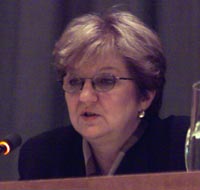 still refuse to link development and environmental sustainability.
She noted the IFF process had created scientific and political momentum
and given incentives to improve national policies. She underscored
the significance of IFF deliberations for other key areas of sustainable
development and said forests are a quintessential global issue.
still refuse to link development and environmental sustainability.
She noted the IFF process had created scientific and political momentum
and given incentives to improve national policies. She underscored
the significance of IFF deliberations for other key areas of sustainable
development and said forests are a quintessential global issue.
 RealAudio excerpts
RealAudio excerpts
|
|
|
Emi
Watanabe, UNDP Assistant Administrator, stated that the IFF can help
turn the tide against the "business as usual" approach by
making decisions that have significant, positive impacts on environments
and livelihoods of poor populations. She highlighted the importance
attached to the sustainable management of forests, which relates directly
to the alleviation of poverty. She noted that UNDP is primarily involved
with financing resources, and called for concrete and determined action
by the international community.
 RealAudio excerpts
RealAudio excerpts
|
Juan Mayr, Colombian
Minister of Environment, former chair of the Biosafety
negotiations and CSD-8 Chair, assured delegates that focusing
on consensus areas could lead to good results and wished them the
best.
|
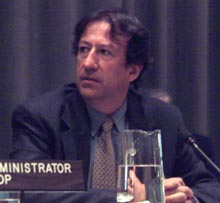 |
Regional and country statements:
|
 PORTUGAL, on behalf of the EU, underscored the need to send
a clear message to CSD-8 and noted broad support for institutionalizing
an international forest policy dialogue. With regard to finance,
he said sustainable forest management should be self-sustaining
in the long-run and encouraged public-private partnerships. He noted
that while the EU has supported negotiating a legally binding instrument,
it remains open to other proposals >
PORTUGAL, on behalf of the EU, underscored the need to send
a clear message to CSD-8 and noted broad support for institutionalizing
an international forest policy dialogue. With regard to finance,
he said sustainable forest management should be self-sustaining
in the long-run and encouraged public-private partnerships. He noted
that while the EU has supported negotiating a legally binding instrument,
it remains open to other proposals >
|
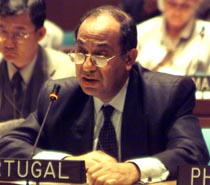 |
|
|
 <
CUBA
noted progress on technical aspects of forests thus far, but expressed
concern over the lack of consensus on political elements. He highlighted,
inter alia, the need for balance between SFM and economic development,
special requirements of different ecosystems, the special needs of
least developed countries and linkages of forests with rural communities
and their development. <
CUBA
noted progress on technical aspects of forests thus far, but expressed
concern over the lack of consensus on political elements. He highlighted,
inter alia, the need for balance between SFM and economic development,
special requirements of different ecosystems, the special needs of
least developed countries and linkages of forests with rural communities
and their development. |
|
The delegate of Nigeria,
spokesperson for the G77/China >
|
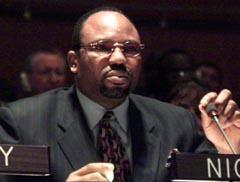 |
Miscellaneous: |
|
|
Juan Mayr (left)
discussing the recent successful outcome of the Biosafety
negotiations in Montreal with Kimo Goree (top right), Managing
Editor of the ENB and Alison Drayton (bottom right), delegate
of Guyana. |
Side-event: NGOs/IPOs on Underlying
Causes of Deforestation |
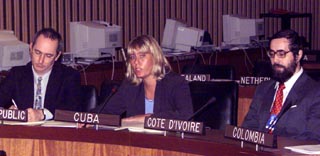 Marcus Colchester, Forest People's Program (left), chaired
the opening day's lunch-hour side-event. The purpose of the event
was to inform IFF participants on progress in the Underlying Causes
Initiative (UCI) and to present various NGO reports on compliance
with IPF obligations >>
Marcus Colchester, Forest People's Program (left), chaired
the opening day's lunch-hour side-event. The purpose of the event
was to inform IFF participants on progress in the Underlying Causes
Initiative (UCI) and to present various NGO reports on compliance
with IPF obligations >>
Simone Lovera (bosques@sobrevivencia.org.py,
center), Friends of the Earth Paraguay, spoke of UCI's latest
activities >>
Andrei Laletin (laletin@online.ru,
right), Friends of the Siberian Forests, discussed the first
national workshop on the underlying causes of deforestaton (UCD),
held in Alusha, Ukraine. The workshop was attended by national,
state and local levels of government; and participants came to a
consensus on the UCD in Ukraine >>
|
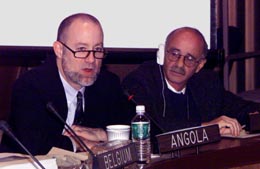 << Bill Mankin (gfpp@igc.org,
left), Global Forest Policy Project, presented a draft report
entitled "Keeping the Promise? An NGO Review of the Implementation
of the IPF Proposals for Action in Select Countries". The
report is a compendium and summary of 40 national evaluations of compliance
with the IPF Proposals, and states that "none of the countries included
in this review adequately carried out their commitment to implement
the proposals of the IPF". The report is available online at
http://www.bionet-us.org.
<< Bill Mankin (gfpp@igc.org,
left), Global Forest Policy Project, presented a draft report
entitled "Keeping the Promise? An NGO Review of the Implementation
of the IPF Proposals for Action in Select Countries". The
report is a compendium and summary of 40 national evaluations of compliance
with the IPF Proposals, and states that "none of the countries included
in this review adequately carried out their commitment to implement
the proposals of the IPF". The report is available online at
http://www.bionet-us.org.
<< Ricardo Carrere, World Rainforest Movement (http://www.wrm.org.uy,
right), presented a summary report of the joint NGO/IPO global
strategy meeting on institutions, arrangements and mechanisms for
action on forests; held 4 and 5 December in Ottawa. Participants at
the meeting emphasized the need for compliance under existing commitments
relating to forests, and discussed the workings of mechanisms required
to ensure such compliance. |
In the corridors:
|
|
What will constitute
the new mechanism(s) to carry forward the work of the IFF is the
main buzz throughout the corridors. Many delegations have come to
the final meeting of the IFF determined to reach consensus prior
to the CSD, but without a clear picture of what such a consensus
will look like. It appears many are hoping that someone will come
forward with a workable model. Many delegations called for political
will, but as one delegate suggested, the fact that there are so
many references to political will signals its absence. It appears
that debate over finances will be a major sticking point, with some
delegates lamenting the fact that the IPF and IFF processes have
yet to bring forward any new sources of funding and wondering whether
such funding is forthcoming.
|
|